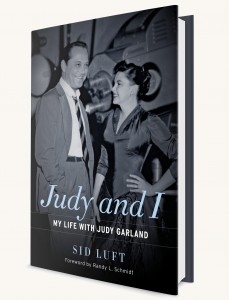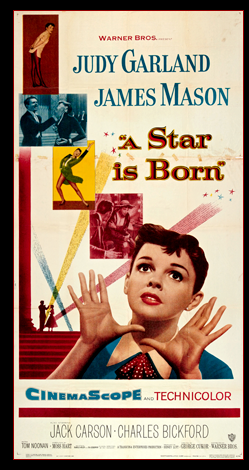 She had the top-selling hit song of 1939 with “Over the Rainbow,” was invited to place her hand and footprints in the cement at Grauman’s Chinese Theatre and was presented with a special Academy Award for Outstanding Performance by a Juvenile Actress in The Wizard of Oz. She may have called it her “Munchkin Award,” but Judy Garland entered the 1940s as a mammoth star. In fact, she was a top-ten box office name in 1940 and would maintain such status for most of the decade.
She had the top-selling hit song of 1939 with “Over the Rainbow,” was invited to place her hand and footprints in the cement at Grauman’s Chinese Theatre and was presented with a special Academy Award for Outstanding Performance by a Juvenile Actress in The Wizard of Oz. She may have called it her “Munchkin Award,” but Judy Garland entered the 1940s as a mammoth star. In fact, she was a top-ten box office name in 1940 and would maintain such status for most of the decade.
“Dorothy won me my first Academy Award,” she exclaimed in an interview at the time. “And Mickey [Rooney] presented me with the golden statue. Mickey and the statue looked like they were swimming, because of the tears in my eyes.” Young Judy was content with her mini Oscar, but as her star grew, so did her longing for a full-size statuette. She went on to star in some of Metro-Goldwyn-Mayer’s biggest successes, including For Me and My Gal, Meet Me in St. Louis, The Harvey Girls and Easter Parade.
A decade later, Judy was excommunicated from her sixteen-year home at M-G-M. For years, she had been habitually late and was notorious for her no-shows, and it finally caught up with her. Judy had made more than two dozen feature films for the studio, but by 1950, she found herself out of work and, to quote much of the press at the time, “unemployable” at the age of 28. “I felt humiliated and unwanted,” she later explained. “I was faced with the bitter knowledge that I’d come to that unhappy position by my own actions—it’s true they were actions I couldn’t seem to help, but they were my own.”
 Under the direction of her third husband, Sid Luft, Judy’s return to films came in 1954 with a musical remake of A Star Is Born, which took several years to make and more than nine months to shoot. The $4.8 million Warner Brothers endeavor was nothing short of phenomenal, a unanimous success, with Time calling Star “a massive effort. Judy Garland gives what is just about the greatest one-woman show in modern movie history. . . . A stunning comeback.” The buzz around Hollywood was that Judy would easily win the Best Actress Academy Award in 1955. There were several indicators: she’d already been honored with the Golden Globe award and Look magazine gave her their “best female performance of the year” designation.
Under the direction of her third husband, Sid Luft, Judy’s return to films came in 1954 with a musical remake of A Star Is Born, which took several years to make and more than nine months to shoot. The $4.8 million Warner Brothers endeavor was nothing short of phenomenal, a unanimous success, with Time calling Star “a massive effort. Judy Garland gives what is just about the greatest one-woman show in modern movie history. . . . A stunning comeback.” The buzz around Hollywood was that Judy would easily win the Best Actress Academy Award in 1955. There were several indicators: she’d already been honored with the Golden Globe award and Look magazine gave her their “best female performance of the year” designation.
“Like just about everybody else, I wanted an Oscar and I wanted it badly,” Judy admitted several years later. “Of course, I knew there was a good chance I wouldn’t win, and anyway an event that meant a lot more to me was coming up in my life. I was going to have a baby.” On March 29, 1955, Judy gave birth to her third child, Joey Luft, at Cedars of Lebanon hospital. She would miss the Academy Awards dinner at the Pantages Theatre the following night, but plans were underway for her to participate in the television broadcast.
“As I lay there in bed, the door burst open and in came a flock of TV technicians.” The NBC network conducted a full-scale invasion of Judy’s hospital room. “Outside my window, they built a platform big enough to launch a rocket,” Judy wittily detailed to McCall’s in their April 1957 issue. “It was three stories high, and the idea was for the cameras to shoot through the window the minute I learned I’d won. . . . They strung wires all around the room, put a microphone under the sheets and frightened the poor nurses almost to death by saying, ‘If you pull up the Venetian blinds before they say Judy Garland, we’ll kill you.’
“Outside the window, I could see the cameramen on the tower getting ready to focus on me in bed. Then someone turned on the TV set and Bob Hope came on. We listened to the whole ceremony, the excitement building up. Then Bob announced the winning actress. It was Grace Kelly. I didn’t have the time to be disappointed, I was so fascinated by the reactions of the men. They got mad at me for losing and started lugging all their stuff out of the room. They didn’t even say good night.”

Jack Warner, Judy Garland, Sid Luft, and columnist and broadcaster George Fisher at the premiere of A Star Is Born
A Star Is Born received six Academy Award nominations (Best Actress, Best Actor, Best Art Direction, Best Song, Best Score and Best Costume Design), but did not take home any Oscars. Insiders reported that the Best Actress count was very close, but the academy members from M-G-M and Paramount are said to have voted for Grace Kelly, who was under contract to the former and on loan out to the latter.
Director George Cukor believed that many of the Academy members were negatively influenced by a series of cuts made to A Star Is Born which greatly disrupted its flow and rhythm. Shortly after the film’s promising premiere, Harry Warner had demanded it be sliced and diced to reduce the run time. His order to cut nearly a half hour of content seriously compromised the film’s continuity.
Judy never got over the hack job done on A Star Is Born that many felt cost her the Oscar that year. “Judy was funny about it; she certainly didn’t flip out,” Sid Luft recalled in his memoir Judy and I: My Life with Judy Garland. “She’d had so many acclaims, so many awards. Groucho Marx sent her the now famous telegram, ‘Greatest robbery since Brinks,’ which pretty much echoed our sentiments.”
Judy Garland died on June 22, 1969, in her London home of an accidental overdose of sleeping pills. She was 47. There was one other Academy Award nomination during Judy’s short life. It was in the category of Best Actress in a Supporting Role for her dramatic performance in Stanley Kramer’s 1961 production of Judgment at Nuremberg. The Oscar went to Rita Moreno for West Side Story.
Additional reading: Judy Garland’s Hollywood Unravelling, Through the Eyes of Her Husband and Producer Sid Luft (The New Yorker)

Randy L. Schmidt wrote the foreword for Judy and I, and meticulously crafted the final sections of this book with artistic license from quotes mined from various interviews and conversations with Sid. He is the editor of Judy Garland on Judy Garland and the author of Little Girl Blue: The Life of Karen Carpenter.
Judy and I goes on sale March 1, and will be available wherever books and e-books are sold.
No Comments
No comments yet.